Sweeping changes underway in the nation’s health care delivery system that expose hundreds of thousands of patients to severe risk of harm are the focus of a major new national campaign by the nation’s largest organization of nurses announced today.
An unchecked proliferation of unproven medical technology and sharp erosion of care standards are rapidly spreading through the health care system, far outside the media spotlight but frighteningly apparent to nurses and patients, says National Nurses United.
In response, NNU has launched a major campaign featuring radio ads from coast to coast, video, social media, legislation, rallies, and a call to the public to act, with a simple theme – “when it matters most, insist on a registered nurse.” The ads were created by North Woods Advertising and produced by Fortaleza Films/Los Angeles. View the new videos and hear the radio ads at www.insistonanRN.org.


This week we continue our series about the shaping of California’s laws and policies by Corporate Democrats. In his second article, Pulitzer Prize-winning investigative reporter Gary Cohn examines how a bill does not become a law when powerful business interests lobby against it.
[divider]
Jim Araby was dead asleep when his cell phone rang at 6 a.m. last June. Until then the labor activist had been enjoying an idyllic family vacation in Guerneville, on Sonoma County’s Russian River. But the number appearing on his phone told him the call was from Sacramento, suggesting bad news. The voice he now heard confirmed it.
“Can you get here?” a union colleague asked. “We need you.”
Araby, a regional director of the United Food and Commercial Workers, listened in dismay as he learned that Assembly Bill 880, which more than half a dozen community groups and unions had supported,


Samuel Quintero has a great responsibility. He is the sole source of income for his mother and younger brother, and has to take desperate measures just to provide what Quintero calls “the bare necessities.”
He adds: “I’ve actually had to rent out my bedroom and other rooms in my house just to get by, and I’m applying for food stamps.”
Quintero has been working at McDonald’s for one year and like many of the company’s employees, says his $8 hourly wage just isn’t enough.
“Sometimes I get the check and I literally don’t even see a dollar from it,” Quintero says. “It goes to the bills or the rent. I see everybody that’s working with me. They’re young and they’re like, ‘Well, we went out and did this or did that,’ and I’m like, ‘I have to support my mom and my little brother.’”
Quintero isn’t alone.
» Read more about: L.A. Fast Food Workers: Hold the Harassment, Supersize the Respect »



Filmmaker, union activist, provocateur – David Koff wore these and other appellations with pride and grace during his 74 years, and left behind many friends and colleagues when he died in March. The first three decades of his professional life were spent as a globe-trotting, Oscar-nominated documentarian who chronicled everything from the legacy of colonialism in Africa to Great Britain’s pervasive anti-black discrimination.
He began a second career as a researcher and filmmaker for UNITE HERE Local 11, and it was during that part of his life, following L.A.’s 1992 civil unrest, that Koff and a small band of activists conceived the idea for what became the Los Angeles Alliance for a New Economy (LAANE). A few years later, his obsessive yet meticulous research exposed the corrosive role of the Kajima Corporation in promoting its construction of the woefully mismanaged Belmont Learning Center near downtown L.A. Koff’s leading role in the take-down of Kajima and its white elephant high school-cum-shopping mall is the stuff of legend and set the platinum standard for the investigation of local corporate cronyism.
» Read more about: David Koff: Celebrating a Life Less Ordinary »



Complexities
A bag of oranges
doesn’t appear
to be heavy
but hold one
yourself and count
three hundred
cars driving by.
As she stands between
the stack of salty
peanuts and dusty
grapes, the bag
gets heavier and it
retains that heaviness
when it’s passed through
the window; and the driver,
hoisting it onto
the passenger’s seat,
thinks, this is a lot of
fruit for two dollars.
[divider]
Source: “Complexities” first appeared in CQ: California State Poetry Quarterly, Winter 1986-1987; Volume 13, Number 4. It was subsequently selected as one of the poems for the 1988 SMARTS (Santa Monica Arts) Poetry on the Bus project. It also appeared as a spoken word track on Vehemence (New Alliance Records, 1993).
Bill Mohr is an associate professor in the Department of English at California State University,
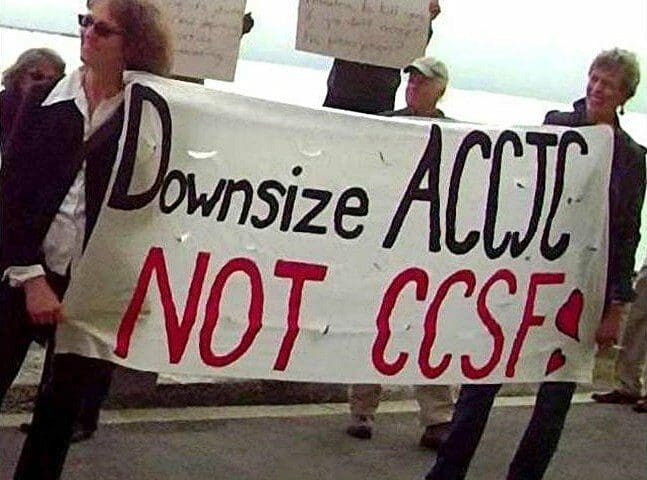
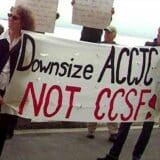
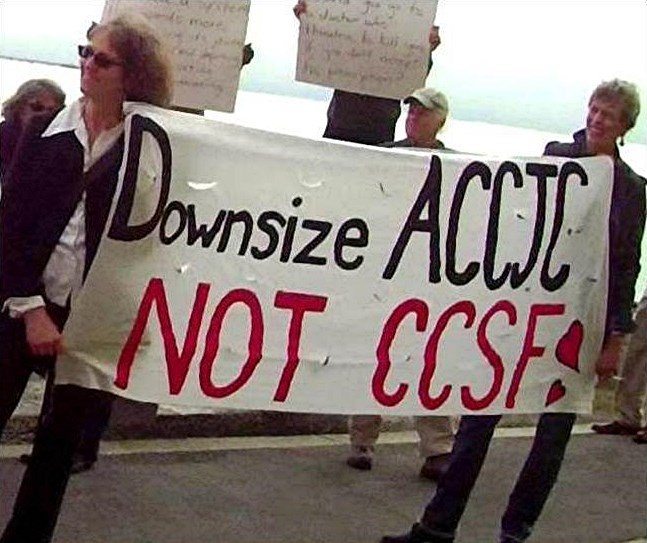
“Truthfully, I’m burned out,” Wendy Kaufmyn sighs over the phone. “And frankly we’re all just really tired. We’re having a meeting next week to try and revitalize ourselves.”
Kaufmyn, a tenured engineering instructor at the embattled City College of San Francisco (CCSF) and a cofounder of the Save CCSF Coalition, is speaking about the 21-month fight for survival of California’s largest community college. The strain and weariness are evident in her quivering voice.
“I’ve been here 31 years,” she tells Capital & Main. “I love City College and I’m just heartsick at what’s going on. I don’t know what’s going to happen.”
Kaufmyn is not alone. Since January, when San Francisco Superior Court Judge Curtis Karnow issued a preliminary injunction that temporarily barred the Accrediting Commission for Community and Junior Colleges (ACCJC) from pulling CCSF’s academic accreditation, a cloud of uncertainty has hung over the 79-year-old institution and the future of its 80,000 students.
» Read more about: No Break in Fight to Save S.F.’s City College »



Last week a Superior Court judge dismissed a final attempt by community groups to score a victory against the Walmart grocery market that opened in Chinatown last year. The groups’ complaint against Walmart brings up a number of factors that undermine the validity of the Chinatown store’s permits. These include zoning and redevelopment requirements that have not been met, poor record keeping by the City, the lack of current California Environmental Quality Act information about the neighborhood, and the fact that the permits were issued the day before a City Council hearing that could have halted the project.
Walmart has long occupied center stage in the national debate about income inequality because of its low wage jobs and ruthless ability to undercut small local businesses. How, then, did the retail giant plant a 33,000-square-foot flag in the middle of Los Angeles’ urban core, despite long-established safeguards designed to protect the unique neighborhood character of places like Chinatown?


 Charter schools that receive public money should be held to the same standards as traditional public schools. That’s just common sense.
Charter schools that receive public money should be held to the same standards as traditional public schools. That’s just common sense.
Unfortunately, many charter schools throughout the country don’t provide all students equitable access, and aren’t transparent and accountable when it comes to public funds.
The House Rules Committee has the opportunity to ensure that a major bill being voted on this week in Congress—H.R. 10, the Success and Opportunity through Quality Charter Schools Act—would require that public charters meet high standards of equitable access, accountability and transparency. To do that, the Rules Committee needs to allow several important amendments to H.R. 10 to come to the floor for a vote. These amendments will help reclaim the promise of public education and require publicly funded schools to operate with integrity.
» Read more about: Congress Weighs Charter School Accountability »
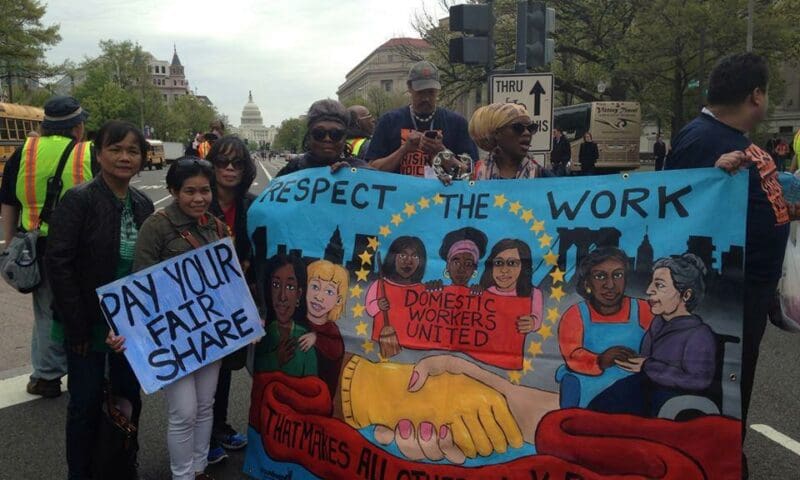
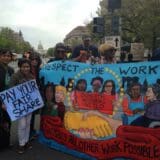

You can find us through Craigslist or fliers at the Laundromat. We live in your homes and prepare your meals. You leave beloved family members in our care. We come from around the globe, often leaving our children behind. But we’re invisible to most Americans. Who are we?
According to Ai-Jen Poo, Director of the National Domestic Workers Alliance, there are 100 million domestic workers in countries throughout the world. In the U.S. they’re key to America’s 21st century economy, caring for children, the elderly and the disabled while family members participate in the workforce. Domestic work is rapidly expanding, she explains, and doesn’t have to represent a road to permanent poverty for its mostly-female workforce.
With 44 local affiliated groups in 26 cities, the Alliance has sponsored legislation throughout the nation to adopt the Domestic Workers Bill of Rights, providing for paid leave,
» Read more about: Domestic Workers: Caring for the American Future »
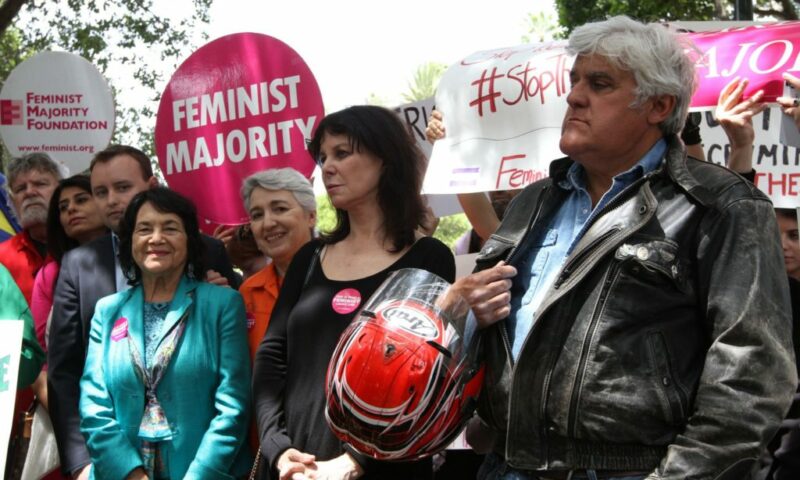

About 80 activists representing feminists, gays and lesbians, workers and Hollywood celebrities rallied in front of the iconic Beverly Hills Hotel Monday afternoon to protest the Sultan of Brunei’s introduction of a brutal version of Sharia law.
Hassanal Bolkiah, who is worth an estimated $20 billion and has been the ruler of Brunei for the last half century, owns the hotel along with the Hotel Bel-Air and other luxury properties around the globe.
The new law technically went into effect last week and will be fully phased in by 2015. It allows for the public flogging of women who have abortions, the stoning to death of gay men and lesbians, and the jailing of women who become pregnant outside of marriage. Thieves could have their right hands and left feet amputated.
Monday’s protest took place in Will Rogers Memorial Park, across Sunset Boulevard from the Beverly Hills Hotel. It was organized by the Feminist Majority Foundation (FMF) and featured former late-night talk show host Jay Leno;
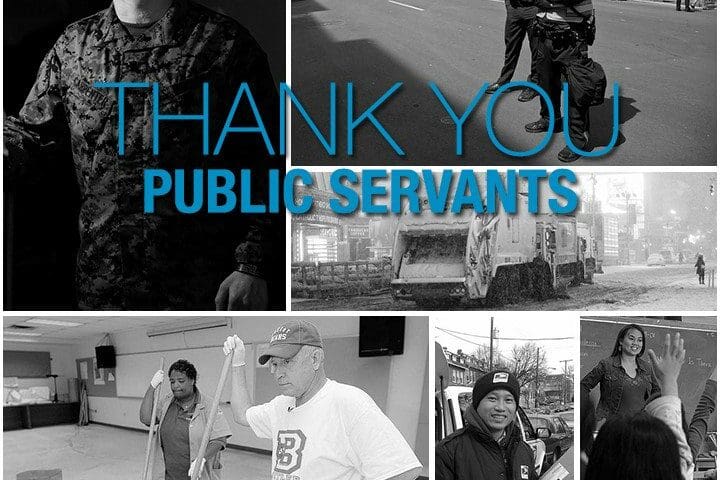


Public servants play important roles in nearly everything we do, but very often they go unnoticed. From food inspectors who keep our food safe to the sanitation workers who keep our neighborhoods clean, we depend on public servants to perform an array of services that make our lives better.
Monday kicked off the first day of Public Service Recognition Week, and we are asking that everyone take a moment to reflect on the importance of these unsung heroes and say thank you.
One easy way you can do that is to download our “Thank You Public Servants” graphic and share it on social media.
You can already find it posted on our Facebook page, and throughout the remainder of the week, we will be using our page to share inspirational stories of public servants who dedicate their lives to improving our communities and our country.


Brunei, the tiny oil-saturated kingdom tucked onto the island of Borneo, recently adopted Sharia law with some gruesome modifications, including death by stoning for homosexual acts, and sentences of flogging and amputation for such lesser “crimes” as having an abortion. The outraged response in Europe and America has been swift and its targets include the Beverly Hills Hotel, the Bel-Air Hotel and other Dorchester Collection Properties, which are owned by the Sultan of Brunei, Hassanal Bolkiah, and the Brunei Investment Agency.
The Feminist Majority Foundation has pulled its annual Global Women’s Rights Awards, co-chaired by Jay and Mavis Leno, from the Beverly Hills Hotel and has launched a massive petition drive and social media campaign calling on the government of Brunei to immediately rescind the new code and asking the United Nations to take action if these laws go into effect as planned.
“We cannot hold a human rights and women’s rights event at a hotel whose owner would institute a penal code that fundamentally violates women’s rights and human rights,”
» Read more about: Brunei’s Brutal Anti-Gay and Misogynist Laws Protested Today »


Lost documents. Incomplete and confusing information. Mysterious fees. Payments received but not applied. Homeowners waiting for a loan modification and suddenly placed in foreclosure. A nightmare of uncertainty, frustration and fear.
These incidents, described to me by numerous homeowners, mortgage counselors and defense lawyers, were supposed to be a thing of the past in California. After revelations of fraud and abuse throughout the mortgage business, including tens of billions of dollars in corporate penalties, state Attorney General Kamala Harris pushed through the 2012 California Homeowner Bill of Rights (HBOR), designed to standardize conduct by mortgage servicers – those companies that manage day-to-day operations on mortgages by collecting monthly payments and making decisions when homeowners go into default and seek help.
Yet one company allegedly committed all these HBOR violations: Ocwen, the nation’s fourth-largest mortgage servicer. According to the complaints, Ocwen (“New Co.” spelled backwards) either skirts around the edges of California law or simply ignores it,
» Read more about: Default Mode: How Ocwen Skirts California’s Mortgage Laws »


 Large corporate lobbies have, in recent years, accelerated their push to expand private charter schools. America spends nearly three quarters of a trillion dollars on public education annually and companies such as “cyber-charter” giant, K12 Inc., Rupert Murdoch’s Amplify and Rocketship, a darling of the venture capital industry, see a pot of gold.
Large corporate lobbies have, in recent years, accelerated their push to expand private charter schools. America spends nearly three quarters of a trillion dollars on public education annually and companies such as “cyber-charter” giant, K12 Inc., Rupert Murdoch’s Amplify and Rocketship, a darling of the venture capital industry, see a pot of gold.
A new report by In the Public Interest Scholar Network member Gordon Lafer, for the Economic Policy Institute, examines recent proposals by Wisconsin state legislators to privatize schools, particularly in Milwaukee, and finds that the proposals won’t help poor kids.
How? The proposals call for public schools in the largest and poorest school district to be replaced with private charter schools that substitute online apps for teachers for a significant part of the day. This “blended learning” model primarily focuses on math, literacy and test preparation, while paying minimal attention to other subjects. Also, money earmarked for Milwaukee students is diverted to fund the company’s ambitious growth plans in other cities.
» Read more about: Privatized Education’s Smoke and Mirrors »


 Cinco de Mayo is a day to lift up the Mexican culture and clink some margarita glasses in celebration. See our recipe below for that delicious cold cocktail as well as a union-made enchilada that no one will be able to refuse. Viva la fiesta!
Cinco de Mayo is a day to lift up the Mexican culture and clink some margarita glasses in celebration. See our recipe below for that delicious cold cocktail as well as a union-made enchilada that no one will be able to refuse. Viva la fiesta!
For one margarita:
1-1/2 oz. Herradura tequila
1-1/2 oz. Montezuma triple sec
1 to 1-1/4 oz. of lime juice
Salt (Morton or Diamond Crystal) for the rim of the glass
Shake all the ingredients with cracked ice in a cocktail shaker until the exterior frosts. Strain into a glass over rocks, or “up” into a cocktail glass.
Union Enchiladas
(Makes 6 servings)
1 cup Manischewitz chicken stock, or water
3 boneless, skinless chicken breasts (Foster Farms, Tyson), cut into strips
1 jar (12 oz.) Pace salsa
1 cup shredded cheddar (Horizon or Alta Dena)
1/2 cup shredded Monterey Jack (Horizon or Alta Dena)
1/2 cup chopped fresh cilantro
1 can (16 oz.) Old El Paso red enchilada sauce
1 can (16 oz.) Old El Paso green enchilada sauce
Durkee cayenne pepper (optional)
12 Mission soft corn tortillas (six inches across)
Heat oven to 425 degrees.


It’s 5:45 a.m. on Wednesday morning and it’s been a long night for Dennis Martinez and his fellow port truck drivers.
Martinez is nearing the end of a 48-hour strike against Total Transportation Services, Inc. (TTSI), the logistics company for which he has worked for two and a half years. The drivers are about to go through the toughest part of the two-day action – asking the company they have been striking against if they can return to work.
The fatigue shows on Martinez’s face. He hasn’t gotten much sleep but he expected that. He knew taking on a wealthy company wasn’t going to be easy.
A slender man dressed in a gray Aero sweatshirt, jeans and tennis shoes, Martinez is 29 but can pass for a teenager. He keeps headphones in his right ear just in case he needs a pick-me-up from Daddy Yankee and Pit Bull, two of reggaeton’s biggest artists.
» Read more about: Daring to Dream: Portrait of a Port Driver »



We’re excited to announce the creation of In The Public Interest’s ITPI Scholars Network as the next step in our growth and expanding influence on the issues of privatization and outsourcing of public services and assets across the country.
The ITPI Scholars Network brings together academics who are experts in diverse fields that relate to government privatization and outsourcing as well as responsible contracting.
Three members of the ITPI Scholars Network have recently released or are close to releasing studies that have found that careless outsourcing can harm communities, taxpayers and vulnerable residents:
• Dr. Daphne Greenwood of the University of Colorado released her new study The Decision to Contract Out: Understanding the Full Economic and Social Impacts. She found that reductions in contracted wages and benefits leads to a host of negative effects for the community at large;
» Read more about: Scholars Network to Analyze Outsourcing and Privatization »
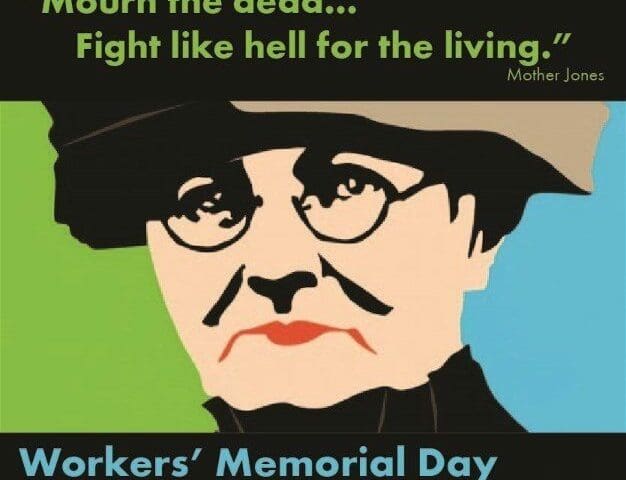
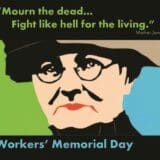

The virtual disappearance of work stoppages in America is hardly a sign of labor contentment but a reminder of how, in today’s hyper-stressed workplace, workers are afraid to protest when they believe their jobs hang in the balance. When a wildcat strike takes place, then, it’s safe to assume there must be powerful motivations behind it.
Baggage handlers working for Menzies Aviation at Los Angeles International Airport saw their 2012 walkout as a matter of life and death. At the time of their strike, three Menzies employees had been killed in California tarmac accidents, prompting workers to file complaints with Cal/OSHA about the workers’ lack of safety training and the company’s cavalier attitude towards faulty electrical equipment and the storage of fuel cylinders. The company took the bad PR and occasional fines in stride, however, and continued to conduct business as usual.
Then, this past February, a worker named Cesar Valenzuela was thrown from the luggage tug he had been driving and run over by the vehicle,
» Read more about: Mourning for the Dead, Fighting for the Living »



My mother went to high school in the early 1950s with Donald Sterling — known in those days by his given name, Donald Tokowitz — but doesn’t remember a thing about him. This could be because Tokowitz was one among hundreds of students at Roosevelt High, but perhaps it was an early metaphor for the future real estate tycoon being a generational anomaly.
By the time she got to Roosevelt, my mom — like Sterling, a child of Jewish immigrants — was steeped in the leftist politics of L.A.’s legendary Eastside neighborhood, Boyle Heights. With sizable numbers of Jews, Latinos, African Americans and Japanese, Boyle Heights was a working class ethnic melting pot in an era when all minorities were subject to varying degrees of the prevailing discrimination targeting anyone who wasn’t white and Christian.
It was also a hotbed of liberal and radical social movements, and the staging ground for some of L.A.’s most effective progressive organizing.
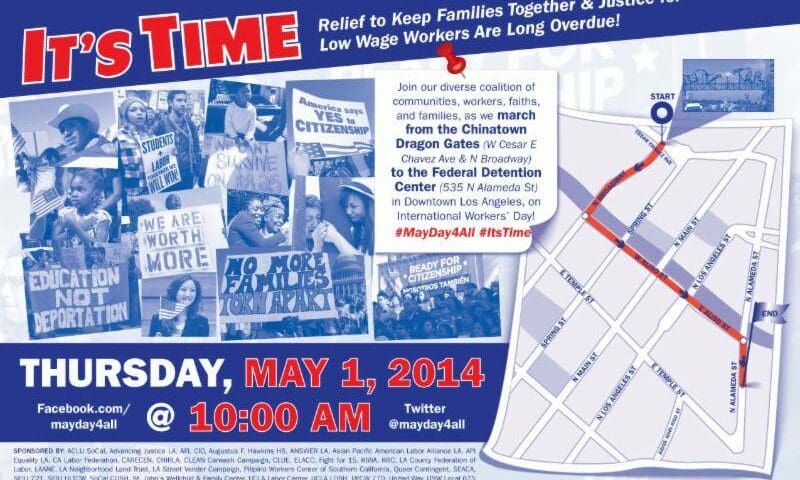

If you’ve had a hankering to visit downtown L.A. to sample artisanal sushi or to nail down a sale on that special luxury loft, Thursday, May 1, might not be the best day. If, however, you’re in the mood to demand that Congress pass immigration reform, or to call for the raising of the minimum wage or to honor the 5,000 American workers who died on the job last year, definitely drop by. The action begins 10 a.m. at Chinatown’s Dragon Gateway (Cesar Chavez Ave. and Broadway) and will move to the Federal Detention Center at 535 N. Alameda St., where marchers will demand the release of undocumented Americans.
Bring plenty of water, a hat or parasol, and any chant that begins, “Two, four, six, eight –” Brought to you by the Los Angeles County Federation of Labor.